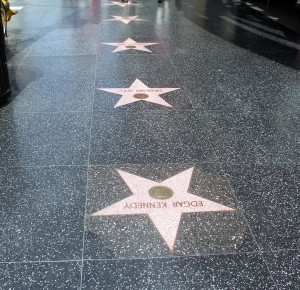When I started seeing the headlines and news segments marking the 20th anniversary of the OJ Simpson murder trial, my first thought was that the whole tawdry saga still felt too recent to be wrapped in nostalgia. My next thought was that, as a college professor, I have seen a big shift over those twenty years in how students perceive the OJ Simpson case.
In the first few years immediately following our culture’s fascination with the Bronco chase, bloody gloves, Johnnie Cochran, Marcia Clark, Judge Ito, and all the rest of it, I could refer to the Simpson case any time I needed an example of an event that captured the attention of an entire culture, an event that you couldn’t get away from even if you wanted to, and that everyone seemed to have an opinion on.
of an entire culture, an event that you couldn’t get away from even if you wanted to, and that everyone seemed to have an opinion on.
I teach literature, and in one course we read some literary works that sprang from another “trial of the century” about a hundred years earlier. That was when Lizzie Borden either did or did not take an axe and murder her parents in their home in Fall River, Massachusetts. Borden, like Simpson, was acquitted, even though many people thought her guilty. The Lizzie Borden case still has a big following (the home where the murder happened is now a hotel that caters to fans), and many movies, short stories, articles, and other works have been devoted to it. Why?
It’s just like the OJ Simpson case, I used to say. Why did everybody want to watch it? Why was the trial carried on so many TV stations? Why was it the talk of the nation? Students could immediately see the connection.
Recently, however, teaching the same literature course at the same university, I tried to use the Simpson case as an example, and all I got were blank stares. OJ Simpson? Some students had a vague idea who he was, but not one knew anything about the case.
The 20th Century as Ancient History
The Simpson case is only one of many twentieth century references I have had to drop. A 20-year anniversary of anything means that it happened before many of my students were born. Most of the freshman students I will get in class this fall were born in 1996. They will have almost no personal memories of the 20th century.
These students certainly know about plenty of things that happened before they were born, but throughout my years of teaching I have observed that there is often a particularly large blank spot about historical and popular culture facts of about 20 to 30 years before the students’ birth.
Students today, for example, generally know much more about the World War II era than about the Reagan era. They also know more about certain aspects of the 1960’s, such as the Kennedy assassination, the Beatles, and even Vietnam, than about Jimmy Carter, the hostages in Iran, and “morning in America.”
The 1980s seem to be a particular black hole in terms of this generation’s knowledge. The 1980s and ‘90s are recent enough that they haven’t learned much about them in history courses but distant enough that they have no personal memories of them. For them, President Reagan is a hazy figure, uncontroversial and wrapped in a glow of nostalgia. I sometimes teach a Joan Didion novel called The Last Thing He Wanted, set in the second half of the 1980s and featuring many aspects of the Iran/Contra scandal. I have to teach the details of Iran/Contra from scratch. No one in my class knows anything about it. Oliver North? Contras? Sandinistas? Blank stares. Most of the students like the novel and enjoy the history, but it’s all new.
The Fleetingness of Fame
It’s not only the history of the era that is unfamiliar to them. I am 52 years old, and I doubt if I could find a single American of my generation who is unfamiliar with Johnny Carson. Most  students today do not know who he is. If you are in my generation, you may find that hard to believe, but find some 18-year-olds and ask them to tell you everything they know about Johnny Carson. You won’t get much.
students today do not know who he is. If you are in my generation, you may find that hard to believe, but find some 18-year-olds and ask them to tell you everything they know about Johnny Carson. You won’t get much.
Many popular movies of that era are also little known among this generation. I have asked for a show of hands of how many students have seen Amadeus or Gandhi, and sometimes not a single hand goes up.
I sometimes teach Shelley’s poem, “Ozymandias,” which is about the fleetingness of fame. It tells of the ruins of a statue an arrogant king lying in the desert. On the pedestal of the statue are the words:
‘My name is Ozymandias, king of kings:
Look on my works, ye Mighty, and despair!’
Nothing beside remains. Round the decay
Of that colossal wreck, boundless and bare
The lone and level sands stretch far away.
My students, in their lack of knowledge of Johnny Carson, OJ Simpson and other people that only a few years ago seemed like people whose fame would last forever, reinforce the theme of this poem: people and events that one generation thinks will last forever will actually be forgotten by the next one.
When I taught “Ozymandias” in the 1990s, I used to compare the imagery in the poem to the toppling of all the statues of Lenin at the time of the fall of the Soviet Union. Students back then had seen those images on the news. Today I can no longer use that example. Students are unfamiliar with those news sound bites.
I don’t say any of this to criticize the students or to imply that they’re uninformed. They’re smart. They know plenty of things that I don’t. Some of my students could tell you a lot about the Kardashians. The only Kardashian I remember is the one who was O.J.’s lawyer.
“For of the wise as of the fool there is no enduring remembrance, seeing that in the days to come all will have been long forgotten.” –Ecclesiastes 2:16
Comments 4
It’s so true! I’ve run into this in my public relations course when I bring up “older” examples of events/crisis situations from the 80s and 90s (like the Challenger explosion) and get questioning looks from students. It’s strange to think of those events as “history” when they still feel recent to me. Then again, sometimes I mention events from two years ago and get blank stares. 🙂
Author
Allison, yes, I think there are now fewer events that we can assume that everyone has in common. And the shelf life of Big Moments gets shorter all the time. Thanks for your comment.
Dr. Bentz, this is true! I do know some of the OJ Simpson case but not very much! I think it is very interesting that though these events are considered historical events as time goes by they are slowly fading. Really interesting perspective!
This is very true. It raises a lot of questions in my mind when I think of how students are now unfamiliar with things that professors are familiar with and vice versa. It makes me wonder, will there come a time when teachers and students wont be able to relate to each other at all? I can imagine being in a class with a really old professor who knows nothing about younger generations and being extremely bored and uninterested. I think its important for both teachers and students to learn about newer and older generations just so they can be more well rounded and understand things in context.